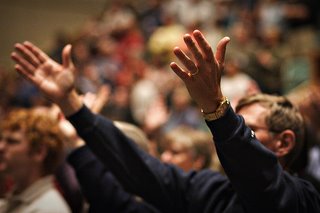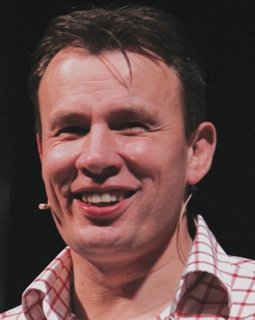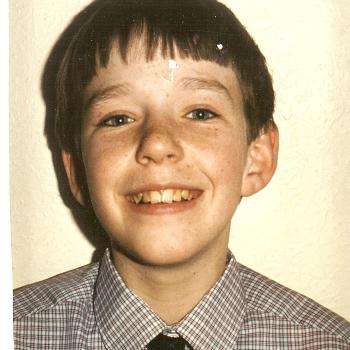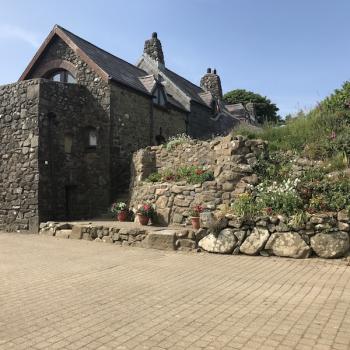 During the worship time this morning, Keith Hazell shared an interesting prophetic word. It spoke about a wind coming that would shake things in our land, but also a great time of blessing for us. He felt that there would be new alliances forged and new opportunities presented to the church by the government.
During the worship time this morning, Keith Hazell shared an interesting prophetic word. It spoke about a wind coming that would shake things in our land, but also a great time of blessing for us. He felt that there would be new alliances forged and new opportunities presented to the church by the government.
This morning’s preacher was David Stroud. Dave leads ChristChurch, London, and the Newfrontiers UK team. He has been involved in leading churches for over sixteen years; ChristChurch is the third church that he has planted. He is married to Philippa, and they have three children.
More posts from this conference can be found on my TOAM08 label page. You can download the mp3 of Dave’s talk or listen to it here:
David began by speaking of how Andrew Murray at Wimbledon was, in an instant, able to turn around from losing and being a point away from elimination to eventually winning the championship. A leader has to ask, “How can I turn things around?” We often have to ask that of ourselves, our families, our churches, and our communities.
When Saul started trembling on the inside, the people picked up on it. The army panicked and went into hiding. Saul got an appraisal from God via a prophet. He was told that he was getting fired. The next man had already been found. Saul gave into fear three times. When that happens, you think about yourself. When that happens, you end up in sin. To understand this, we must see the contrast between Saul and Jonathan. Saul is bad, Jonathan is good, and we are to learn from him. Jonathan says, “C’mon! Let’s go up!” His amor bearer says, “I’m with you!” Attacking up hill is difficult.
The goal was to go to the outpost, but panic meant the whole army would kill each other. It is all about Jonathan through the entire passage to the end, when it says, “The LORD saved Israel.”
 What can we learn from this passage?
What can we learn from this passage?
Jonathan Did Not Give Up Hope
When you give up hope you do nothing because there is nothing to do. Saul was hopeless, but Jonathan had boldness. Optimism is good, but it’s not enough. Anyone can do optimism, but what God has called us to do is fundamentally different. It is something rooted in God. Jonathan’s outlook was shaped by the Lord, what he knew of God, and what God had promised the people.
We can have hope because of what Jesus has done. The big hope-giver is his resurrection. He wasn’t just a man who lived and made incredible claims. Because he is raised, you realize everything he said is true.
When your God is not in the grave, people get transformed and healed. One man from their church came out of the theater after a meeting and asked a homeless man if he wanted a meal. The homeless man replied that he couldn’t walk to a nearby Kentucky Fried Chicken because his feet were so swollent. So the guy from the church went and brought back the food to him. Then he prayed for him and the man’s feet were totally healed. He was leaping for joy, saying, “Jesus healed my feet!!” There is a scene in Lord of the Rings where it is said, “Everything sad is going to come untrue” because of the resurrection of Gandalf. How much more the resurrection of Jesus!!
Jonathan said, “Perhaps the Lord . . .” — He keeps breaking in on our lives!
If you are a man of hope you will gather the right people around you. Then you can stand on their shoulders. Look for faith and flexibility in the hearts of the people you want to draw around you.
Saul was very lazy. Nobody even noticed people leaving the camp. Even the basics were being badly done. The most basic thing is turning up. It’s your relationship with God. How is it going? Easier to be with the Lord when you have hope. Stay good at the basics. Keep your life pure. David was also lazy on the basics (on the roof, not at war). Don’t be lazy. Hope fuels intimacy.
Saul was a maintenance man, but Jonathan was focused on expansion. When Saul saw the enemy running, you would have thought he would rush in. Instead, he took a roll call. He wanted to know who was responsible, what had happened—like a management approach. We should be about breaking out from here and breaking into new areas. Are you keeping everything running smoothly or are you breaking out?
Saul Was Stuck in Passivity
Jonathan was full of action. Saul was not. We can get into cycles where we never get interrupted. We can lead quiet lives of desperation. What stops us from taking the initiative? Mostly not knowing whether it’s the right thing or not. But neither did Jonathan. Sometimes God confirms things once we are moving, rather than while we are standing still waiting. Take action and expect God to speak as you go. Don’t wait to be sure that it is right before you take the first steps.
There were obstacles ahead. Jonathan had an army lacking in motivation, with two swords, an unassailable position, and just one other man with him. You don’t have to know how to overcome the obstacles before you reach them.
The fear of failure. We don’t like failing. But that wasn’t an obstacle. We will massively limit the number of things we do if we think we need to be sure it will work before it starts. The ones who succeed the most are the ones who fail the most. Don’t allow the concern of failing to hold you back. A long list of failings means you can have a long list of successes as well. The LORD had given the Philistines into their hands. He gets going, but is waiting for faith before he takes the really big step.
There is a world of difference between bravado and faith. You need your own faith. We do sometimes hear someone else’s story and our faith is ignited. Real faith is given when we KNOW what is going to happen. The walk of faith—up the cliff. He had no defenses as it was hands and feet. He had to keep going. When they got to the top, they did what they could do, with God’s help. The task at hand was actually quite small. Twenty men were killed. Then God did something far bigger. Panic and an earthquake from God came. They couldn’t have done that!
Dream and ask the Lord—“What can I do that is imaginably more than I could ask or dream?” Our dream is that our nation will feel different. That there will be that atmosphere. We want to see tens of thousands coming to Christ, with vast churches built that are full of the Word and Spirit. We want the appetite for gossip to change so that the newspapers have to change what they print. That the prisons are empty. That more people get married and stay married. That the poor get hope from the Church. That stories and films will be created that are positive, wholesome, and are blockbusters. That people who think develop scholarship that defends godliness and goodness. We want godly artists that make our culture richer. No one of us can do that. But if each of us take our individual outposts, who knows what God will do?
This was a faith-imparting m
essage. It painted a big picture of a vision for a transformed nation. It raised our hopes and encouraged us to take those little actions that God is putting before us.















